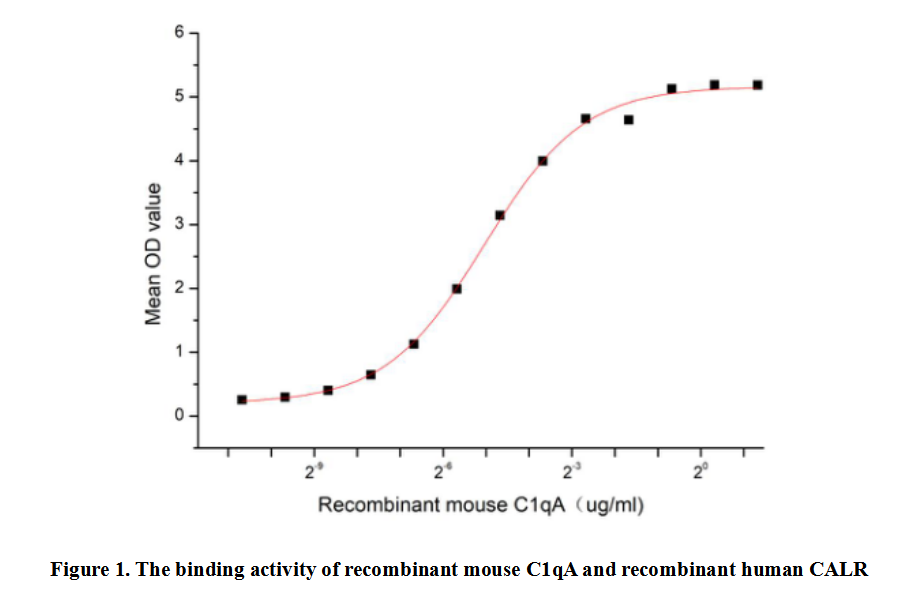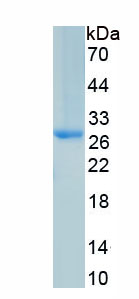Active Complement Component 1, Q Subcomponent A (C1qA)
Complement Component 1,q Subcomponent,Alpha Polypeptide
- Product No.APD207Mu01
- Organism SpeciesMus musculus (Mouse) Same name, Different species.
- Buffer FormulationPBS, pH7.4, containing 0.01% SKL, 5% Trehalose.
- Traits Freeze-dried powder
- Purity> 95%
- Isoelectric Point9.6
- ApplicationsCell culture; Activity Assays.
- DownloadInstruction Manual
- UOM 10µg50µg 200µg 1mg 5mg
- FOB
US$ 267
US$ 668
US$ 1336
US$ 4008
US$ 10020
For more details, please contact local distributors!
ACTIVITY TEST

Complement Component 1, Q Subcomponent A (C1qA) is a protein that plays a crucial role in the innate immune system. It is part of the C1 complex, which is the first component of the classical complement pathway. The C1 complex is composed of one molecule each of C1q, C1r, and C1s. C1q is the recognition subcomponent of the complex and and initiating the complement cascade. C1qA plays a key role in eliminating pathogens, regulating inflammatory response and maintaining immune tolerance. It is reported that C1qA can bind to the C-terminal of CALR through its gelatin-as-region, and this interaction may play an important role in regulating complement activation and cell signaling. Thus a functional binding ELISA assay was conducted to detect the interaction of recombinant mouse C1qA and recombinant human CALR. Briefly, C1qA was diluted serially in PBS with 0.01% BSA (pH 7.4). Duplicate samples of 100 μl were then transferred to CALR-coated microtiter wells and incubated for 1h at 37℃. Wells were washed with PBST and incubated for 1h with anti-C1qA pAb, then aspirated and washed 3 times. After incubation with HRP labelled secondary antibody for 1h at 37℃, wells were aspirated and washed 5 times. With the addition of substrate solution, wells were incubated 15-25 minutes at 37℃. Finally, add 50 µL stop solution to the wells and read at 450/630 nm immediately. The binding activity of recombinant mouse C1qA and recombinant human CALR was shown in Figure 1, the EC50 for this effect is 0.03 ug/mL.
USAGE
Reconstitute in 10mM PBS (pH7.4) to a concentration of 0.1-1.0 mg/mL. Do not vortex.
STORAGE
Avoid repeated freeze/thaw cycles. Store at 2-8°C for one month. Aliquot and store at -80°C for 12 months.
STABILITY
The thermal stability is described by the loss rate. The loss rate was determined by accelerated thermal degradation test, that is, incubate the protein at 37°C for 48h, and no obvious degradation and precipitation were observed. The loss rate is less than 5% within the expiration date under appropriate storage condition.
GIVEAWAYS
INCREMENT SERVICES
-
 BCA Protein Quantification Kit
BCA Protein Quantification Kit
-
 Molecular Mass Marker for Protein
Molecular Mass Marker for Protein
-
 Monoclonal Antibody Customized Service
Monoclonal Antibody Customized Service
-
 Polyclonal Antibody Customized Service
Polyclonal Antibody Customized Service
-
 Protein Activity Test Experiment Service
Protein Activity Test Experiment Service
-
 Electrophoretic Mobility Shift Assay (EMSA) Experiment Service
Electrophoretic Mobility Shift Assay (EMSA) Experiment Service
-
 Buffer
Buffer
-
 Lentivirus Packaging Experiment Service
Lentivirus Packaging Experiment Service
-
 Adenovirus Packaging Experiment Service
Adenovirus Packaging Experiment Service
-
 Real Time PCR Experimental Service
Real Time PCR Experimental Service
-
 Spike RBD Protein (S-RBD)
Spike RBD Protein (S-RBD)
-
 Protein G
Protein G
-
 Protein A
Protein A
| Magazine | Citations |
| J Cell Mol Med | LCN2 is a new diagnostic biomarker and potential therapeutic target in idiopathic short stature Pubmed:35610759 |
| Journal of Biological Chemistry | Competitive inhibition of the classical complement pathway using exogenous single-chain C1q recognition proteins Pubmed:35690144 |
| Catalog No. | Related products for research use of Mus musculus (Mouse) Organism species | Applications (RESEARCH USE ONLY!) |
| RPD207Mu01 | Recombinant Complement Component 1, Q Subcomponent A (C1qA) | Positive Control; Immunogen; SDS-PAGE; WB. |
| APD207Mu01 | Active Complement Component 1, Q Subcomponent A (C1qA) | Cell culture; Activity Assays. |
| PAD207Mu01 | Polyclonal Antibody to Complement Component 1, Q Subcomponent A (C1qA) | WB; IHC |
| SED207Mu | ELISA Kit for Complement Component 1, Q Subcomponent A (C1qA) | Enzyme-linked immunosorbent assay for Antigen Detection. |







